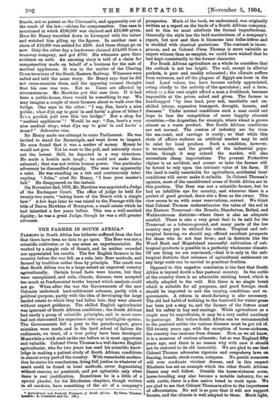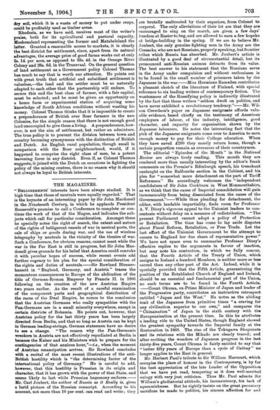THE FARMER IN SOUTH AFRICA.* FARMING in South Africa has
hitherto suffered from the fact that there have been no data to go upon. The Boer was not a scientific cultivator, or in any sense an experimentalist. He worked by a simple rule of thumb, and he neither recorded nor appreciated his results. The few English farmers in the country before the war fell, as a rule, into Boer methods, and farmed by tradition rather than by principle. The result was that South Africa was to a large extent an unproved country agriculturally. Certain broad facts were known, but they were unexplained, and soils, climate, diseases, were accepted too much as fundamental truths beyond which analysis could not go. When after the war the Governments of the new Colonies undertook land-settlement schemes, partly with a political purpose, partly with the idea of developing the large landed estate to which they had fallen heir, they were almost without expert guidance. The skilled English agriculturist was ignorant of South African conditions ; the South African bad rarely a grasp of scientific principles, and in most cases had not elaborated his experience into any intelligible system. The Governments fell a prey to the pseudo-expert, grave mistakes were made, and in the hard school of failure the rudiments, we trust, of a true policy have been developed. Meanwhile a work such as the one before us is most opportune and valuable. Colonel Owen Thomas is a well-known English agriculturist, who for two years has used his scientific know- ledge in making a patient study of South African conditions in almost every part of the country. With remarkable modera- tion he states his conclusions, doing full justice to whatever of merit could be found in local methods, never dogmatising without reasons, no pessimist, and yet optimistic only when there is real justification. Sometimes he is a little of a special pleader, for his Rhodesian chapters, though written in all candour, have something of the air of a company's
• Agricultural and Pastoral Prospects of South Africa. By Owen Thomas. London: A. Constable and Co. res.] prospectus. Much of the book, we understand, was originally written as a report on the lands of a South African company, and to this we must attribute the formal imperfections. Generally the style has the bald succinctness of a company's report, but now and then it blossoms into belles-lettres and is studded with classical quotations. The contrast is incon- gruous, and as Colonel Owen Thomas is more valuable as expert witness than as essayist, we could have wished that he had kept consistently to the former character.
For South African agriculture as a whole he considers that the outlook is not too bright. The soil, except in alluvial pockets, is poor and readily exhausted ; the climate suffers from extremes, and all the plagues of Egypt are loose in the land. Land values, too, have become unduly appreciated, owing chiefly to the activity of the speculator; and a farm, which t a fair rent might afford a man a livelihood, becomes impossible at the prices asked and given. The farmer is handicapped "by dear land, poor soil, unreliable and un- skilled labour, expensive transport, drought, locusts, and diseases." Under normal conditions such a man could not hope to face the competition of more happily situated countries,—the Argentine, for example, where wheat is grown almost as a waste product. But South African conditions are not normal. The centres of industry are far from the sea-coast, and carriage is costly; so that while this state of affairs endures an artificial market may be said to exist for local produce. Such a condition, however, is terminable, and the growth of the industrial popu- lation, though it may extend the market, will also necessitate cheap importations. The present Protective regime is an accident, and sooner or later the farmer will be forced to rely upon the intrinsic value of his farm. If the land is really unsuitable for agriculture, accidental local conditions will never make it suitable. In Colonel Thomas's opinion, most of the uncultivated areas of South Africa are in this position. The Boer was not a scientific farmer, but he had an infallible eye for country, and wherever there is a pocket of good ground, there sits a Boer as the owner. This view seems to us, with some reservations, correct. We think that Colonel Thomas underestimates the value of the soil in the Eastern Transvaal—the Ermelo, Standerton, Bethel, and Wakkerstroom districts—where there is also an adequate rainfall. There is also a very great deal to be said for the Transvaal as a tobacco-ground, and many parts of the low country may yet be utilised for cotton. Tropical and sub- tropical farming, we should say, offered excellent prospects for those who do not fear fever; and in districts like the Wood Bush and Magatoland successful cultivation of sub- tropical products is possible in a perfectly wholesome climate. Of one thing we are convinced,—that it is only in the sub- tropical districts that schemes of agricultural settlement on any large scale can be carried to practical fruition.
Opposed to this negative conclusion is the fact that South Africa is beyond doubt a fine pastoral country. In the cattle of the country there is an admirable existing breed, which is wholly adapted to the veld. But there is no single breed which is suitable for all purposes, and good foreign stock should be imported to suit the varying conditions and re- quirements. A reform in stock-farming is also necessary. The old bad habit of trekking to the bus hveld for winter grass has been put a stop to, and the farmer of the future must find his safety in hay and ensilage. While agriculture as a staple may be unprofitable, it may be a very useful auxiliary to pasturage. But before South Africa can be recommended to the pastoral settler the various diseases must be got rid of. Till twenty years ago, with the exception of horse-sickness, the country was immune from disease. Now, as we all know, it is a museum of curious ailments; but so was England fifty years ago, and there is no reason why with care it should not be restored to its old immunity. We are glad to see that Colonel Thomas advocates rigorous and compulsory laws on fencing, brands, stock-routes, outspans. No gentle measures will ever eradicate virulent disease, and in this respect Rhodesia has set an example which the other South African States may well follow. Outside the horse-sickness areas, horse-breeding may also become a notable industry, for, as with cattle, there is a fine native breed to work upon. We are glad to see that Colonel Thomas is alive to the importance of afforestation. No soil is so poor that it will not support forests, and the climate is well adapted to them. Much light,
Rhodesia, as we have said, receives most of the writer's praise, both for its agricultural and pastoral capacity, Mashonaland representing the former and Matabeleland the latter. Granted a reasonable access to markets, it is clearly the best district for settlement, since, apart from its natural advantages, the average price of good farms works out at only 2s. id. per acre, as opposed to 33s. 4d. in the Orange River Colony and 28s. 6d. in the Transvaal. On the general question of land settlement as a Government policy Colonel Thomas has much to say that is worth our attention. He points out with great truth that artificial and subsidised settlement is valueless,—the land and the settler must be so naturally adapted to each other that the partnership will endure. To secure this end the best class of farmer, with a fair capital, must be selected; and he must be given an opportunity on a home farm or experimental station of acquiring some knowledge of South African conditions without wasting his money. Colonel Thomas thinks that it is impossible to create a preponderance of British over Boer farmers in the new Colonies, for the simple reason that there is not enough good land unoccupied to give them a living. A preponderance, how- ever, is not the aim of settlement, but rather an admixture. The true policy is to prevent the division between town and country becoming synonymous with the distinction of British and Dutch. An English rural population, though small in comparison with the Boer neighbourhood, would, if it happened to comprise the right class of men, be a potent leavening force in any district. Even if, as Colonel Thomas suggests, it joined with the Dutch on occasions in fighting the policy of the mining centres, there is no reason why it should not always be loyal to British interests.
THE MAGAZINES.



























































 Previous page
Previous page